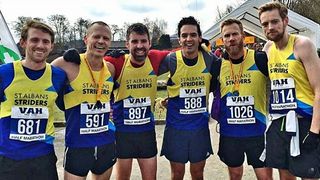London Marathon 2017: do runners really care about tech?
Day 9: Our Running Man of Tech finds out which gadgets get you buzzing

It’s the day before the London Marathon, and after yesterday’s heavier column, I felt like today should be a bit more tech-filled (and cheerier).
But you’ve heard enough from me now, so I wanted to find out what other runners thought about technology and running - am I just an idiot who loves tech when everyone else is just running around free and easily?
Nah, of course not. Maybe not to the same level as me, but there’s no doubt that technology is here to stay as a way to expand the running experience.
So I spoke to a wide range of runners - of all styles and speeds - from my running club the St Albans Striders and #teamcardio, the team set up for the Cardiomyopathy charity I’m running for tomorrow.
I wanted to find out the tech they used, whether they felt it was really necessary and how they saw the future of running and tech - and there are some decent ideas in here, if anyone is feeling like putting a prototype on Kickstarter…
What tech do you use when running, and why?
“[I use the] Garmin ecosystem as it’s the current gold standard for GPS running watches,” says Rav Dighe. “And I've probably tried most variations of their products since they separated from Timex!”
That’s the common theme among everyone I’ve spoken to, with Garmin being the main brand most are using. It seems that the dominant models come from the 200, cheaper, series - as it does the main things most people are after, which is (unsurprisingly) what most people want it for.
Get the best Black Friday deals direct to your inbox, plus news, reviews, and more.
Sign up to be the first to know about unmissable Black Friday deals on top tech, plus get all your favorite TechRadar content.
However, one of the most enjoyed features was the ability to instantly sync runs to popular run-tracking platform, Strava: “I like to use [my Garmin Forerunner 225] for time and distance run,” says Tony Barr.
“Plus, I like when I get home and [sync] Strava it then pops up and says that I managed a personal record on certain segments.”
The Apple Watch is, perhaps surprisingly, the second most-mentioned device, but all those who responded with that answer were using it with Strava it seems - the basic data just isn’t good enough for the stat-hounds.

TomTom also gets an honorable mention too - showing that it’s still the lower-cost watches that are the most popular among the running groups.
One interesting thing I noticed: among those that race, the Aftershokz Trekz Titanium headphones are the main models used, given they’re the only headphones you can use in every race legally.
However, a good portion of those I spoke to running the London Marathon are using them too, in a race where you're allowed to use any headphones you wish - showing that it’s as much about being able to have ears open to the atmosphere (while still listening to music) as it is about safety.
- Want to watch the race? See our London Marathon live stream guide
Do you like the idea of tech being used to run?
“Tech isn't going to do the running for me, but it can make me a more effective me!” says Steve Gillan (who also wants an app that will only ping when you've burned enough calories to eat a chocolate bar... someone, make that now).
That’s the common theme with this question - most people like the idea of being able to track their runs, but many admit that it can be a torture device as much as a help:
”I've used GPS watches for a while and used to rely on them too much. Now I mostly use them for logging mileage and try to run by feel as best I can,” says Nairn McWilliams, the man with possibly the most Scottish name in the world.
“I am interested in training by heart rate though, especially because I have tended to run my easy runs too hard in the past.”
Nairn also pointed out that for racing, learning to read the body’s reactions is possibly more important - and that tech can sometimes get in the way of that - a feeling echoed by coach Mike Jubb:
“Unless [technology] is used to slow you down in a longer race (to avoid blowing later) then I believe you'll finish faster by focussing on 'racing' without it.”
However, there are still many that enjoy running for the pure, meditative status it brings:
“For me, it's about the atmosphere,” says Kelly Doyle. “And on event like London Marathon the crowd is amazing - and no tech, in my opinion, can beat that!”
What one thing would you like to see invented to help you run better?
“Maybe a pill that awakens my body after 10 minutes of waking up and not the 2-3 hours it takes?” says Pablo Plaza Lastras, with his tongue pressed to his cheek. Hopefully he means legally…
The really interesting thing here is that three very strong themes have emerged from the answers I got: route guidance on a run, an adaptive training plan that works to your own speed, and a monitor that can tell you when you need to slow down and speed up to hit your goal.
“It would be cool have a watch with sat-nav, that you could say to ‘I'd like to do 10 miles today’ and have it compute a safe route you've never done before and direct you,” says Zoe Randle.
“I’d like Google Glass-type technology (that doesn’t require a phone) and gives me the information I want during a run,” adds Neil Mallon - showing there’s a genuine appetite for the smart glasses that are being promised by brands such as Recon Jet and Sony.
“I have just found the pace feature on my [Garmin] watch and would like this to be a bit more accurate. It vibrates too much,” says Joanne Tang. “Also, I like the idea of putting in a specific distance and time and it works out and vibrates to tell me to go faster.”
“I’d like an automatic training plan that automatically analyses your Strava from, say, the last six months, asks you for your race and time goal then tells you how realistic this is based on analysis from your runs,” says Bobby Riddaway - which is instantly something I’d love.
What’s most interesting about all of this is that all of this stuff already exists in one form or another… it’s just not readily available in a widely-used format.
Actually, the pace / distance guidance is - TomTom watches have that and, to a certain degree, Garmin too, although it seems the prods to keep you on track with pace aren’t militant enough.

But adaptive training plans are coming, from brands ranging from Omegawave to Arion, based on heart rate data or biomechanical stresses. But as they’re limited to those that really want to try them out (and spend a fair amount to do so) they’re not widely known.
So here’s what brands clearly need to do: stop putting in features that people don’t know about. It’s all very well that the Garmin 735XT can monitor vertical oscillation, but if that watch could create routes for you, tell you how to do them and how fast you should be running, there would be a strong attraction for nearly every runner surveyed.
Strava has training plans too - but right now, they’re rather off-the-shelf and not adapted to the user. Given there’s so much data being flung through their servers by athletes, we need to see more smarts spewing out from all the data we’re giving these brands.
I’d also like to give a special mention to the incredibly specific answer given to this question from Mike Lancaster, when asked what he’d like to see invented - and now, I want it too:
“I want something that I swallow, is inert and provides a heads up display of: what position I'll finish the race in, a tracker of people I vaguely know that will finish just in front of me and how fast I need to run to catch them on the final straight.
“I also want to know where the quickest and slickest water dispenser is and where the photographer with the cheapest - but best photos - is stood.”
The final countdown
I’ve enjoyed bringing you the thoughts of other runners (mostly because you're probably tired of hearing the witterings from my own brain).
But I'm now at that familiar point in the day where I've got loads to do and not enough time to do it before I should be in bed, getting a good night's sleep... so I'm going to thank you all for reading this far through the journey, thank ALL the people who got in touch following yesterday's column (it really meant a lot).
So I'd just like to say this: if you're running tomorrow, you don't need luck. Just promise to try as hard as you can and remember... there will always be someone slower (and faster) than you.
If you've got any tech questions ahead of the big day - or just about running in general - feel free to get in touch using the links below, or the email address in my author bio by clicking my name at the top of this page! I've loved hearing from everyone so far, and it'd be great to find out more about all your running journeys.
- Gareth Beavis is TechRadar's Running Man of Tech, bringing you a daily diary as he counts down to the big race at the London Marathon.
- Day 1: The reasons behind the run
- Day 2: The tech I'll use to take the start line
- Day 3: In search of the perfect training plan
- Day 4: The tech you'll need to start running
- Day 5: The conundrum of working out the perfect pace
- Day 6: Running the final 6 miles of the London Marathon
- Day 7: Smart insoles are the tech star of the London Marathon Expo
- Day 8: Running through darkness: my marathon struggle with anxiety
- - If you want to say hi, he's @superbeav on Twitter
- You can see his stumblings on Strava
- And for more data, follow him on Smashrun
- And if you want to get the full lowdown on the latest and greatest running tech, read the rest of the Running Man of Tech story here

Gareth has been part of the consumer technology world in a career spanning three decades. He started life as a staff writer on the fledgling TechRadar, and has grown with the site (primarily as phones, tablets and wearables editor) until becoming Global Editor in Chief in 2018. Gareth has written over 4,000 articles for TechRadar, has contributed expert insight to a number of other publications, chaired panels on zeitgeist technologies, presented at the Gadget Show Live as well as representing the brand on TV and radio for multiple channels including Sky, BBC, ITV and Al-Jazeera. Passionate about fitness, he can bore anyone rigid about stress management, sleep tracking, heart rate variance as well as bemoaning something about the latest iPhone, Galaxy or OLED TV.